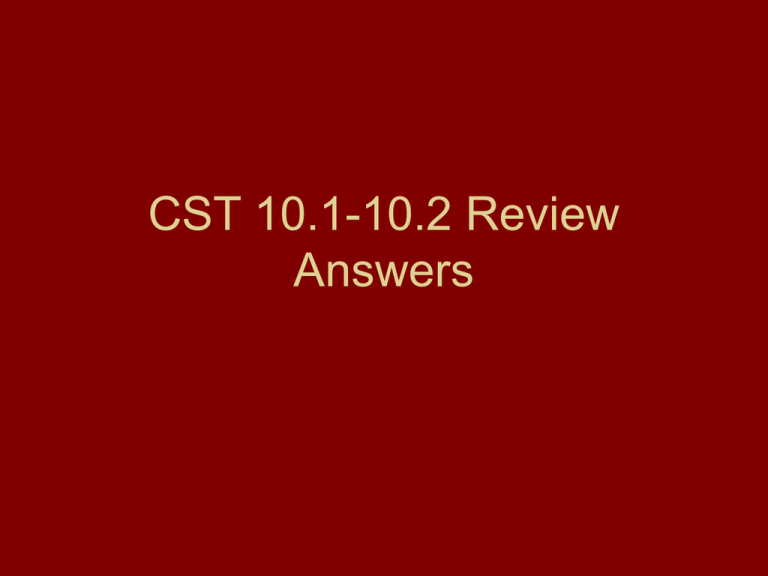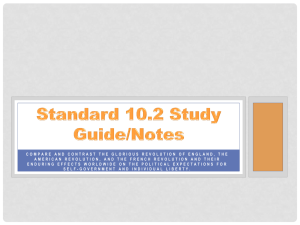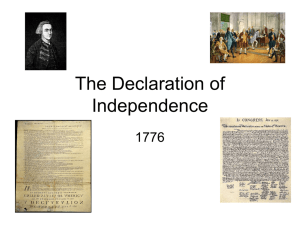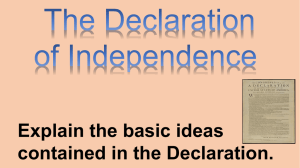CST 10.1-10.2 Review Answers
advertisement

CST 10.1-10.2 Review Answers 10.1.1 Review What was groundbreaking about the development of democracy? • 1. Choice B is correct. Democracy, founded on the belief that the people have the ability to govern themselves, either directly or indirectly (through representatives), brought new structures and practices to government. A political system in which representatives are elected by the people follows the model of • 2. Choice B is correct. A political system in which representatives are elected by the people is called a republic. In the Greco-Roman view, the world is governed by natural laws that can be discovered through • 3. Choice A is correct. In the GrecoRoman view, the world is governed by natural laws that can be discovered through reason and intellect. In Judeo-Christian tradition, helping others in need should be the • 4. Choice D is correct. Judeo-Christian tradition holds that every individual has a responsibility to help others. Greco-Roman and Judeo-Christian traditions share an emphasis on • 5. Choice D is correct. Greco-Roman and Judeo-Christian traditions share an emphasis on individual choice. GrecoRoman democracy emphasized political choice, while Judeo-Christian tradition emphasizes the moral choice between good and evil. What was one means by which Greco- Roman and Judeo-Christian values spread throughout Europe in the first centuries A.D.? • 6. Choice B is correct. The spread of the Roman Empire was one means by which Greco-Roman and Judeo-Christian values were dispersed. 10.1.2 Review In ancient Greece, the word tyrant referred to a leader who • 1. Choice A is correct. In ancient Greece, the word tyrant referred to any leader who took over the government. According to ancient Greek philosophers, with whom did a tyrant share power? • 2. Choice D is correct. An ancient Greek tyrant held all power and shared it with no one. What was the primary activity of a philosopher in ancient Greece? • 3. Choice C is correct. The primary activity of a philosopher in ancient Greece was to use logic and reason to consider the world. Plato wrote that a tyrant can become dangerous because every tyrant has too much • 4. Choice A is correct. Plato says that a tyrant is dangerous because the ruler has too much freedom. According to Aristotle, why does a tyrant govern against the will of the people? • 5. Choice C is correct. Aristotle says that ultimately, a tyrant governs against the will of the people because such a ruler cares only about self and selfish needs. Ancient Greek philosophers helped the development of democracy by • 6. Choice D is correct. Ancient Greek philosophers’ respect for logic and human thought helped to create a climate in which democracy arose. 10.1.3 Review What principle is reflected in the quotation from the Japanese Constitution? • 1. Choice C is correct. The Japanese Constitution, which was developed with the help of U.S. general Douglas MacArthur after World War II, starts by saying that the government gets its authority from the people—a principle known as popular sovereignty. The U.S. Constitution reflects the principle of federalism by • 2. Choice A is correct. The U.S. Constitution reflects the principle of federalism in that state and national governments share power. A new government based on the principle of popular sovereignty must • 3. Choice C is correct. Popular sovereignty is the idea that a government gets its authority from the people and reflects their will. The division of South Korea’s government into three branches with distinct powers reflects the principle of • 4. Choice B is correct. The division of South Korea’s government into three branches with distinct powers reflects the principle of separation of powers. What guarantees freedom of speech to U.S. citizens? • 5. Choice B is correct. The Bill of Rights— specifically the First Amendment— guarantees freedom of speech to U.S. citizens. 10.2.1 Review The European intellectual movement that emphasized the responsibility of government to protect people’s natural rights was called the • 1. Choice C is correct. The Enlightenment was a European intellectual movement that emphasized people’s natural rights and influenced movements for democracy. The phrase “natural rights” is original to and central to the writings of which philosopher? • 2. Choice A is correct. The idea that people possess natural rights—rights that are theirs by birth, rather than the gift of a government—was developed by John Locke. The Declaration of Independence expresses the philosophy that the power of government comes from • 3. Choice B is correct. The Declaration of Independence expresses the Enlightenment idea that the power of the government comes from the people. Which statement best summarizes the role of government in the social contract? • 4. Choice A is correct. In the social contract, the primary role of the government is to carry out the will of the people. What principle is directly reflected in the division of a government into three branches? • 5. Choice B is correct. The three-branch system of government reflects the principle of separation of powers. The ideas of Locke and Rousseau influenced Simón Bolívar in his commitment to • 6. Choice D is correct. Simón Bolívar’s beliefs as a revolutionary were profoundly influenced by the Enlightenment philosophies of Locke and Rousseau. 10.2.2 Review Which of the following rights in the U.S. Bill of Rights comes from a provision in the Magna Carta? • 1. Choice D is correct. The right to due process of law, which is included in the U.S. Bill of Rights, has its origin in a provision in the Magna Carta. Which statement best summarizes the idea of representative government as it was established in the English Bill of Rights? • 2. Choice B is correct. As it is laid out in the English Bill of Rights, the concept of representative government states that laws should be made and carried out by an entity that represents the will of the people. English colonists in America expected to have representative government in the colonies because • 3. Choice A is correct. English colonists in America expected to have representative government in the colonies because of England’s tradition of representative government. The idea that governments get their power from the people they govern is called • 4. Choice B is correct. The idea that governments derive their power from the people they govern is known as popular sovereignty. The American Declaration of Independence and the French Declaration of the Rights of Man and Citizen both • 5. Choice B is correct. The American Declaration of Independence and the French Declaration of the Rights of Man and Citizen both emphasize the rights of the people. The term “unalienable rights” in the American Declaration of Independence refers to rights that • 6. Choice C is correct. The term “unalienable rights” refers to rights that a government cannot take away. 10.2.3 Review A key issue that sparked the colonists to declare their independence from England was • 1. Choice C is correct. A key issue that sparked the colonists to declare their independence from Great Britain was respect for the colonists’ rights. Which statement best describes the context in which the Declaration of Independence was issued? • 2. Choice B is correct. The American Revolution broke out in 1775 with the Battle of Lexington and Concord, and in 1776 the American colonists issued the Declaration of Independence. John Adams, second U.S. president, said that even before the War for Independence began, “The Revolution was in the hearts and minds of the people.” What is the best way to paraphrase Adams’s meaning? • 3. Choice D is correct. In saying that “The Revolution was in the hearts and minds of the people,” President Adams meant it was rooted in their convictions about individual rights and the necessity of representative government. Which document was written before all the others? • 4. Choice C is correct. The Declaration of Independence was issued in 1776. The Articles of Confederation were accepted by the states in 1781, and supplanted by the U.S. Constitution in 1787. What is one reason that the American Revolution resulted in a stable democracy, while some other revolutions did not? • 5. Choice C is correct. One reason that the American Revolution resulted in a stable democracy, while the French Revolution did not, is that the Americans soon legislated both a strong government and protections for individual rights. What feature was shared by the major revolutionary movements of the late 1700s and early 1800s? • 6. Choice A is correct. The revolutionary movements of the late 1700s and early 1800s shared the idea that the power of a government rests with the consent of the governed. 10.2.4 Review Among the causes of the French Revolution was the • 1. Choice A is correct. The excessive spending of King Louis XVI was among the causes of the French Revolution. The king accumulated tremendous debts and then imposed heavy taxes on the people. In pre-Revolutionary France, estates were • 2. Choice B is correct. In preRevolutionary France, the people were divided into three social classes known as estates. Who carried out the “Reign of Terror” in France? • 3. Choice D is correct. The Reign of Terror was carried out by the Committee for Public Safety, which guillotined thousands of people, including King Louis XVI and his wife, Marie Antoinette. Which statement best describes the circumstances in which Napoleon Bonaparte took power? • 4. Choice C is correct. Napoleon took power in 1799, ten years after the start of a Revolution that brought chaos, poverty, and terror. What form of government did Napoleon Bonaparte lead? • 5. Choice D is correct. Napoleon was dictator of France. 10.2.5 Review Who was the most important European leader at the Congress of Vienna? • 1. Choice D is correct. Prince Klemens von Metternich, foreign minister of Austria, was the most influential leader at the Congress of Vienna. Which statement is true of the outcome of the Congress of Vienna? • 2. Choice A is correct. The leaders of the Congress of Vienna achieved a better balance of power among European nations. What was the primary concern of the Concert of Europe? • 3. Choice C is correct. The members of the Concert of Europe were deeply concerned about the possibility of revolution, such as had occurred in France. The Revolutions of 1848 had a lasting impact because they • 4. Choice B is correct. Although the Revolutions of 1848 were quickly and violently put down, their influence was long-lasting and their ideals persisted. Which statement would an Austrian nationalist in the 1840s be most likely to make? • 5. Choice D is correct. Nationalists believed that they were united with their fellow people by virtue of shared history, culture, and territory, among other factors. Germany and Italy became two unified nation-states as a result of • 6. Choice C is correct. Germany and Italy became unified nation-states as a result of nationalist efforts. • STUDY!!! • Remember the District Exam is on Friday • Don’t forget– you should also be working on prepping your essay response for my final • Ms. Ramos’ Final – 100 multiple choice/matching – 1 five paragraph essay







